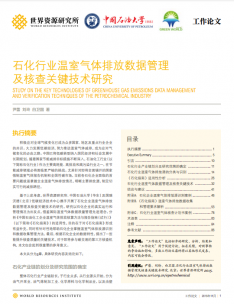Study on the Key Technologies of Greenhouse Gas Emissions Data Management and Verification Techniques of the Petrochemical Industry

It has been a consensus of countries, regions, and companies from key industries to actively tackle global climate change. To develop low-carbon economy and promote greenhouse gas reduction is the only road leading to this initiative. China has made low-carbon transition a part of the middle-term and long term planning of the national economy and social development. As the targets and measures of state energy conservation and emission reduction programs constantly deepen, the Petrochemical Industry will surely face more difficult challenges in energy conservation and emission reduction as a high energy consumption, high emission, and high pollution industry. As the State Mandatory Reporting of Greenhouse Gases and the National Carbon Market will be under way in the near future, petrochemical companies shall first of all know their GHG emissions, identify main emission sources, and prepare executable emission reduction paths accordingly.
Considering the above mentioned, the World Resources Institute, University Of Petroleum(East China), and Green World (Beijing) Low-Carbon Economy & Technology Center jointly conducted research on petrochemical GHG emission data management systems and key verification techniques.
Starting with the actual operation and management of petrochemical companies, the research analyzes the applicability of Guidelines for Petrochemical GHG Emissions Accounting Methods and Reporting (for Trial Implementation) (hereinafter the Petrochemical Guidelines) with a reference to advanced thoughts on GHG data quality management in the international community. It is intended to provide a useful supplement to the Petrochemical Guidelines and pointedly assist petrochemical companies to master the methods of GHG emission source identification as well as data acquisition and management. Finally, the research proposes key techniques to improve verification quality according to the data characteristics of petrochemical companies. This research has important reference significance for those their party verification bodies to be involved in carbon trading.